FlashGrid Cluster
for Oracle RAC on Google Cloud

FAQ
Is Google Cloud suitable for running Oracle Database?
Yes. FlashGrid Cluster was available on Google Cloud before Oracle introduced a DBaaS offering for their own cloud, OCI. Multiple availability zones in each Google Cloud region, coupled with FlashGrid Cluster, enable high availability and fault tolerance exceeding a typical on-premises Oracle Database deployment.
What are the benefits of running an Oracle RAC database with FlashGrid in GCP?
Public cloud uptime SLA covers only VM instance uptime. It does not cover software or OS patching, crashes, or corruption. FlashGrid with Oracle RAC provides true database high availability with active-active redundancy between two or more database node VMs. If zero RTO and zero RPO are your targets then you should look at running FlashGrid with Oracle RAC.
How does FlashGrid help deploy a mission-critical application in GCP?
FlashGrid offers HA database architecture that allows full control and the flexibility to meet future database and infrastructure requirements:
- Active-active or Fail-over database clustering based on proven FlashGrid and Oracle clustering technologies.
- Full control of sizing, patching/updates, and database features. You have the root@ access.
- Portability between cloud providers.
- Ease of deployment similar to DBaaS.
How can FlashGrid help us with moving our existing Oracle databases to GCP?
FlashGrid enables running Oracle RAC in the cloud. Even if you have been using only single-instance databases, consider using the FlashGrid with Oracle RAC to increase database availability and to mitigate the lack of control over the compute and storage resources. Additionally, FlashGrid Launcher fully automates the process of configuring Oracle RAC clusters and allows creating a cluster on GCP cloud in less than two hours.
How can FlashGrid help us move our existing Oracle databases to Google Cloud?
FlashGrid enables HA database architecture in Google Cloud. If you have been using only single-instance databases, consider using FlashGrid Cluster to increase database availability and mitigate the lack of control over the compute and storage resources. Additionally, FlashGrid Launcher fully automates the process of configuring Oracle database clusters and allows the creation of a cluster in Google Cloud, AWS, or Azure in less than two hours.
How can we migrate our data from on-premises to GCP?
The migration process is similar to migrating a database between two datacenters. Depending on the size of the database and tolerable downtime, you can use one of the regular migration tools, such as RMAN backup/restore, export/import, or DataGuard replication.
Can a database cluster in Google Cloud match the performance of our on-premises cluster?
Testing performed at FlashGrid and by our customers demonstrated performance levels matching or exceeding the performance of high-end on-premises systems. See the Performance Considerations section in the architecture documentation for Google Cloud, AWS, and Azure. Our engineers can help you analyze your application performance needs and size the database cluster accordingly – request a demo.
Do we get 24/7 technical support for mission-critical deployments in GCP?
Yes. For cloud deployments, FlashGrid Technical Support Services cover the entire infrastructure stack and are included in the Marketplace fees.
How can we get help with deploying a cluster in GCP?
We are happy to guide you through the process. Email us to schedule a screen sharing session with one of our engineers.
How do we purchase FlashGrid licenses and support on GCP?
FlashGrid is deployed through GCP Marketplace. The marketplace software fees include FlashGrid software license and technical support.
How much performance overhead does FlashGrid create in GCP?
Compared to a single-instance database, a RAC database has overhead for communication and data mirroring between the nodes. However, clustering adds CPU, memory, and disk resources that speed up parallel operations. The FlashGrid software itself consumes negligible amount of system resources.
Does FlashGrid provide an alternative to Oracle RAC on GCP?
No, FlashGrid does not replace or emulate any part of the RAC software stack. FlashGrid provides storage, network, and automation capabilities for running Oracle RAC in public clouds.
What is the maximum Oracle database size supported in Google Cloud?
FlashGrid Cluster for Oracle RAC and FlashGrid Cluster for Oracle Failover HA have architectures that do not limit Oracle database size. Up to 100 TB is practical with 2 or 3 hyper-converged nodes, and 500+ TB is possible with separate storage nodes.
How many RAC nodes per cluster can be supported in GCP?
The FlashGrid architecture does not impose strict limits on the number of RAC nodes. In most cases we recommend two or three nodes. To reduce network overhead we recommend increasing the size of the nodes (up to 224 cores) before adding more nodes. 2+2 redundancy across two availability zones may be used for extra HA. Clusters with 4+ nodes are possible for extra-large capacities.
Which Oracle Database versions does FlashGrid support?
Oracle Database versions 19c, 18c, 12.2, 12.1, and 11.2 are supported. We test with the latest PSUs / RUs as they are released. For the latest information, please visit this knowledge base article.
Are Oracle licenses included?
Oracle licenses and support must be purchased directly from Oracle.
